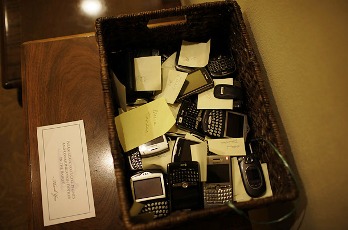I finally got an iPhone.
Not exactly a Luddite, I tend to go first by need, then by ability to learn. I just learned how to use the navigation device in my car and I must admit it was the first time I drove the streets of San Francisco and looked like I knew where I was going.

It’s the same with the iPhone. A few quick lessons (from Kyle, my TechGenie whose manners are always impeccable!) and I was off enjoying the fact that I could read in-coming e-mail from my shirt pocket as well as articles from the New York Times and Wall Street Journal.
However, I don’t really need to check my e-mail that often. And before navigation in cars, I got along well with Auto Club maps (later, MapQuest); as for the Times and Journal, I still read the physical paper every morning.
Let’s face it, when a new piece of technology comes out many of us tend to indulge. It’s all part of “improving our lives” as the ads say, (which is really code for, “we’ve come up with another new distraction that you don’t really need right now, but we’re selling it anyway”). Growing up, I would buy a new record album two or three times a month; a new stereo, however would wait until some significant improvement came along once every four or five years.
Now, due largely to the advancement of digital technology and programmers, the next smart-anything comes out every few weeks or months. The good news: laptops are faster and more powerful at a generally lower cost. The bad news: due to work and now social networking we are becoming increasingly dependent on them and more isolated in our own little worlds. While eating in a New York restaurant, I witnessed a young couple walking down the street. Each had one arm around the other while they were both talking or “tweeting” on line. Twitter seems to be taking the place of real human conversations with people.
High tech gadgets have always been in healthy supply in recent years. What’s been in short supply are the manners that should be included in the instructions.
The chief executive of a marketing firm in Manhattan noticed a decided lack of manners at a business meeting with a potential client. The man kept fiddling with his iPhone.
“An hour,” the New York Times wrote, “seemed a bit much. After an hour and a half, [the executive] and his colleagues wondered what the man could possibly be doing with his phone for the length of a summer blockbuster.
“Someone peeked over his shoulder. ‘He was playing a racing game… We didn’t say anything. We still wanted the business.’”
“Smart” technology, has enabled all of us to e-mail, Tweet,Facebook, MySpace or game our way through the day. However, it has also enabled many of us to think only of ourselves instead of others.
John Bridges and Bryan Curtis picked up on this back in 2006 and wrote 50 Things Every Young Gentleman Should Know. Subtitled, What to Do, When to Do It, and Why, this slender little hardback reacquaints all of us with everyday manners for living, including cell phones.
First, they lay out the basics: “A cell phone can be a great thing. But it can also lead some people to forget their basic manners and annoy others.”
Then they describe what you do and don’t do and the reasonwhy: “You do… Be respectful of others, even if your cell phone starts ringing.
“You don’t… Ignore the person you are talking with in order to make a call, or receive a call…
“Why… it is rude to expect other people to stand around and wait while you are talking to somebody else on your cell.”
And finally, “A gentleman does not engage in loud cell phone conversations while standing in line in public places or while waiting for the bus.”
Among the other useful topics in the little book: Saying “Thank You”; Making an Apology; Accepting a Gift you Don’t Like; Writing a “Thank You” note. And my personal, dog-eared piece: Knowing When to Keep Your Mouth Shut.
The book is a thought-filled reminder to all of us to remember to be a little more considerate.
So, how does the White House handle cell phone manners? As pictured above, all cell phones are left in a little basket outside the oval office with a the following polite note: “Please leave your cell phones and communication devices in the basket… Thank You.”
Comments










